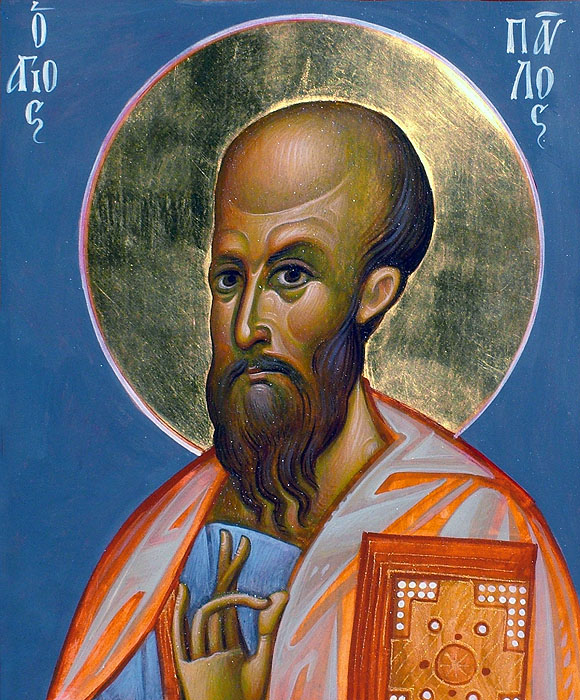What Paul Received and Handed On (Fr. Patrick H. Reardon)
20 Σεπτεμβρίου 2016
Inasmuch as the letters of St Paul are apparently the earliest writings in the New Testament, he is commonly—and not inappropriately—thought of as the Church’s earliest theologian. This persuasion, nonetheless, should not be taken to mean that the Church had no theology prior to Paul’s conversion. Indeed, on the very day Ananias baptized him, there already existed an authoritative body of Christian belief —a paradosis or “tradition”— of which Paul himself became both the appreciative heir and the ardent proponent.
With respect to Christology, In particular, Paul was familiar with many points from that earlier tradition. He knew, for instance, that Jesus was a human being (Romans 5:15; 1 Corinthians 15:21). He also knew that Jesus was a Jew (Romans 9:5; Galatians 3:16) and that he ministered to the Jews (15:8). Paul was sufficiently familiar with Jesus’ earthly life to know that he had a mother and brothers (1 Corinthians 9:5; Galatians 4:4); he even knew the name of one of those brothers (Galatians 1:19).

Saint Paul. Icon by Ioan Popa, Romania, 2008
Through the testimony of those directly familiar with Jesus’ earthly life, Paul learned of
- “the meekness and gentleness of Christ” (2 Corinthians 10.1; cf. Matthew 11:29),
- of his “grace” (2 Corinthians 8:9),
- of his “obedience” (Romans 5:19), and
- of his “patience” (2 Thessalonians 3:5).
Paul’s familiarity with Jesus, furthermore, made it possible to “imitate” him (1 Corinthians 11:1).
With the events of Holy Week, particular, Paul was familiar with the major details. He knew, for instance, that the Lord gave the Eucharist to the Church on the evening of his arrest (1 Corinthians 11:23-25; cf.5:7). He knew that Jesus, though murdered through a Jewish plot (1 Thessalonians 2:15), suffered a Roman execution (1 Corinthians 2:8; Galatians 3:12). He was familiar with the details of Jesus’ Resurrection (1 Corinthians 15:1-7).
Arguably weightiest among such references is Paul’s comment with respect to
“Christ Jesus, who, bearing witness (martyresantos) before Pontius Pilate, made the good confession (ten kalen homologian) (1 Timothy 6:13).
The special significance of this reference to Pontius Pilate is twofold: First, it bolsters the historicity of Paul’s reference to Pilate in Luke’s account of his preaching at Pisidian Antioch (Acts 13:28). Second, it attaches “the good confession” of Jesus to the documented memory of political and social history. In fact, this attachment of the Christ-event to world history was perceived to be so important that it led to the insertion of Pilate’s name into the creedal formulas of the Church.
Nor was Paul unfamiliar with the teaching Jesus gave during earthly ministry. Since this is not the place to examine the many parallels between the ethical doctrines of Jesus and Paul, it probably suffices to mention other indications of Paul’s familiarity with Jesus’ teaching. For example, Paul declares with confidence,
“For this we say to you by the word of the Lord, that we who are alive, remaining until the coming of the Lord will have no advantage over those who have fallen asleep (1 Thessalonians 4:15).
He knew of Jesus’ injunction against divorce (1 Corinthians 7:10 ) and his instruction that
) and his instruction that
“those who preach the Gospel should draw their living from the Gospel” (9:14).
In addition, St. Luke records from the lips of Paul a dominical logion that does not appear in any of the gospels:
“It is more blessed to give than to receive” (Acts 20:25).
In what forms did Paul receive this traditional information about Jesus? He received it, first of all, through the teaching ministry of the Church, beginning with the instructions he received from Ananias, the pastor of the congregation in Damascus, when he received Paul into the obedience and sacrament of faith. The living Church also conveyed the inherited faith to Paul through the words of her kerygmatic and catechetical material, her creedal forms, her hymnography, and her other prayers.
With respect to Paul’s access to the Church’s early kerygmatic and catechetical material, it may suffice to mention his well-known references to the “traditions” he “received” and “handed on”:
Therefore, brethren, stand fast and hold the traditions (paradoseis) you were taught, whether by word or our epistle (2 Thessalonians 2:15).
But we command you, brothers, in the name of our Lord Jesus Christ, that you withdraw from every brother who walks disorderly and not according to the tradition (paradosin) which they received (parelabosan) from us (3:6).
Now I praise you, brethren, that you remember me in all things and keep the traditions (paradoseis) just as I handed them on (paredoka) to you (1 Corinthians 11:2).
I received (parelabon) from the Lord what I also handed on (paredoka) to you (11:23).
I handed on (paredoka) to you, among the first things, that which I also received (parelabon) (15:3).
Source: preachersinstitute.com




